Folklore of Lincolnshire (3 page)
Read Folklore of Lincolnshire Online
Authors: Susanna O'Neill

The decoy ducks had led their new friends into the netted area and all were feeding greedily, oblivious to the nets gradually lowering down on them with one end nipping into a point.
Suddenly a dog was let out and came towards them barking ferociously. The ducks all attempted to fly away but the net prevented their escape. They were instead driven towards the narrow point of the net where a man was waiting to catch them, one by one.
The decoy ducks were also caught but their fate was not the same as their new companions. They were stroked, calmed and placed back into a safe pond with plenty of food, ready for another flight to Europe. As for the foreign visitors, let us just hope the folk of Lincolnshire are kinder to people than ducks!
T
HE
D
EVIL AND
HIS
S
ERPENT
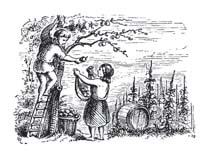
Fables about the Devil abound all over the British Isles, and Lincolnshire is no exception. Superstition in Lincolnshire would not allow people to use his name: ‘Don’t say the Devil. Say the Owd Lad or he’ll come when he’s called.’
1
Ethel Rudkin confirms this notion,
2
noting how he goes by many names in Lincolnshire, such as Old Nick, Old Sam, Sammiwell, Old Harry, the Old ‘Un or Old Lad. However, even if he is not referred to directly, his appearances all over Lincolnshire are still rife – or maybe it is because of his regular visits that people try not to attract his attention!
Of course, there are exceptions to the rule and some people like courting trouble. It was believed by such folk that if you were to drop a pin in the keyhole of a church door and then run around the church seven times that the Devil would appear. Quite what they would do then is unclear.
The legend of Dorrington Church boasts a similar belief. On a clear, moon-lit night you can peek through the keyhole to watch the Devil playing with glass marbles across the church floor.
Exactly what Old Nick looks like we are not sure, although there is one story, retold by Rudkin,
3
that describes him as a ‘funny little ole man’. He appeared when a young girl at Crosby decided she wanted to become a witch, and so at midnight one time she visited an old woman known locally as a witch. The old woman told the girl that, in order to become one, she must stand up then bend over and touch her toes, saying ‘all that I ‘ave a-tween me finger tips an’ me toes I give to thee’ (meaning the Devil). So the girl did as instructed, but just as she was half-way through her sentence, ‘She see’d a funny little ole man come in an’ sit i’ th’ chair opposite to ‘er.’ This figure frightened the girl, who suddenly ended the sentence with ‘I give to – Almighty God!’ instead of the Devil. ‘Well! – there was a ter-do-ment!
The little ole man disappeared in a ‘urry, an’ th’ owd woman was fit ter kill that lass, an’ she was very glad ter escape out th’ ouse.’
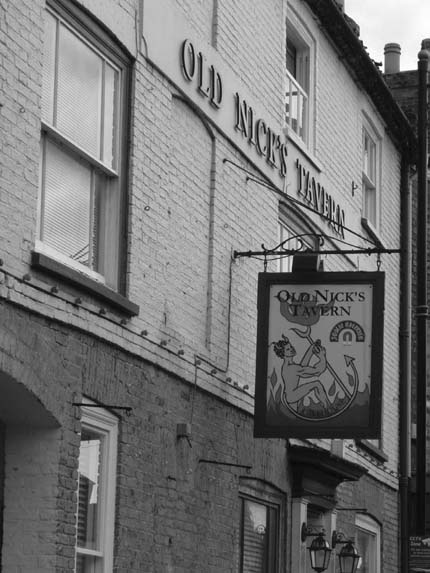
A pub sign in Horncastle, an example of the Lincolnshire tradition of never naming the Devil directly.
Folklorists Gutch and Peacock
4
relate a tradition used in Lincolnshire to have power over the Devil. They say on St Mark’s Eve at midnight to hold two pewter platters under bracken for the seeds to drop into. The seed will go right through one and be caught in the other held below, whereupon the Devil will appear riding upon a pig and tell you anything you wish to know.
It is upon a huge black pig that the Devil will appear, again on St Mark’s Eve, at Willoughton, but bizarrely only if you attempt to stop the horses and sheep which apparently kneel down and talk on this night. Legend states that whilst waiting in the stables some men did try this, but just before the appointed hour (always midnight) a mighty wind blew open the stable doors with a tremendous bang, whereupon the men fled home, terrified.
Also, a sure way to escape the contract if you have sold your soul to the Old Lad is to say he can amass the debt either inside the house, or outside. Then when the payment time comes, sit astride a windowsill or doorframe and he cannot collect.
If you wanted to see him, he is said to appear when he hears the clock strike twelve at The Devil’s Pulpit stone in Tealby. He is supposed to come down to the stream for a drink. The only problem is you could be waiting a long while, as who knows when the Devil hears the clock strike here?
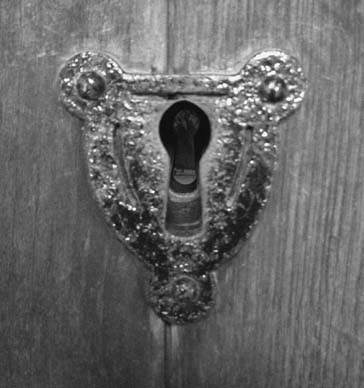
The church keyhole at Dorrington, through which one can observe the Devil playing marbles across the floor at night.
There is another Devil’s Pulpit in Hemswell – a slab of rock that juts out above the natural spring. At the bottom of the hill here there is another stone which, legend states, children used to visit. They would apparently stick little pins into the holes in the rock, run round and round it very fast, then put their ears to the stone, and allegedly hear the Devil talking. One can understand this practice when observing the stone, as it is an unusual spherical shape.
The most well-known story of the Devil in Lincolnshire has to be connected to Lincoln Cathedral. A carving of him, peering over a witch’s shoulder, can be seen high upon the side of the cathedral. This image gives credence to the old saying, ‘He looks as the Devil over Lincoln’.
5
This particular phrase, used when one is jealous or has malicious intent, is said to derive from the displeasure of the Devil when the cathedral was built:
The Devil is the map of malice, and his envy, as God’s mercy, is over all his works. It grieves him whatever is given to God, crying out with that flesh devil, ‘Ut quid hæc perditio’ (what needs this waste?). On which account he is supposed to have overlooked this church, when first finished with a torve and tetric countenance, as maligning men’s costly devotion, and that they should be so expensive in God’s service.
6
So annoyed was he at the completion of the building that legend states he decided to pay it a visit with his two little imp friends and have some fun.
I’ll blow up the chapter, and blow up the Dean;
The canons I’ll cannon right over the screen;
I’ll blow up the singers, bass tenor and boy;
And the blower himself shall a blowing enjoy;
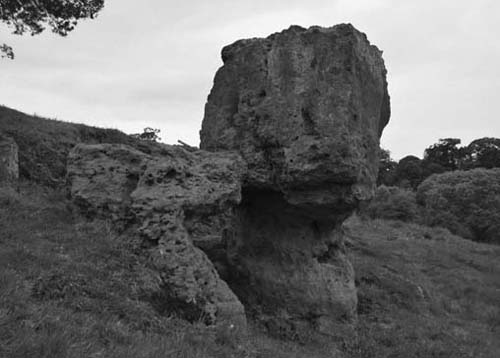
The Devil’s Pulpit or Chair, situated on private land at the bottom of Beckhill Road, Tealby
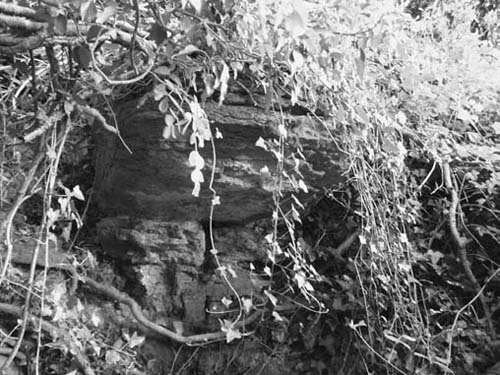
The Devil’s Pulpit in Hemswell. Across a field and up a hill from Brook Street, this juts out of the cliff face, above three small springs.
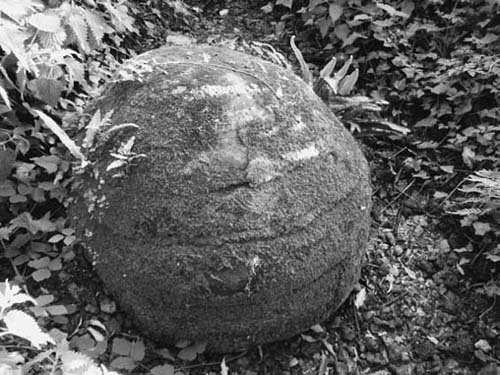
Spherical rock just below the Devil’s Pulpit stone at Hemswell. A spring runs out around the rock.
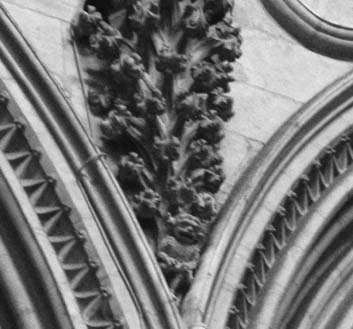
The Lincoln Imp, located in Lincoln Cathedral’s Angel Choir, high up on the last but one column.
The organist, too, shall right speedily find
That I’ll go one better in raising the wind;
I’ll blow out the windows, and blow out the lights,
Tear vestments to tatters, put ritual to rights!
7
The imps entered the cathedral and began to cause chaos, tearing down tapestries, knocking over pews, pushing the bishop around and generally being very unpleasant and unruly – until an angel appeared and ordered them to stop. Of course they did not stop but carried on with their havoc until the angel had no choice but to make them stop. Just as one imp was throwing a rock at the angel, he was suddenly turned to stone in his tracks. The other, horrified, escaped and left the cathedral well alone but the petrified imp still stays in the cathedral as a reminder that the Devil should not toy with God’s work!
